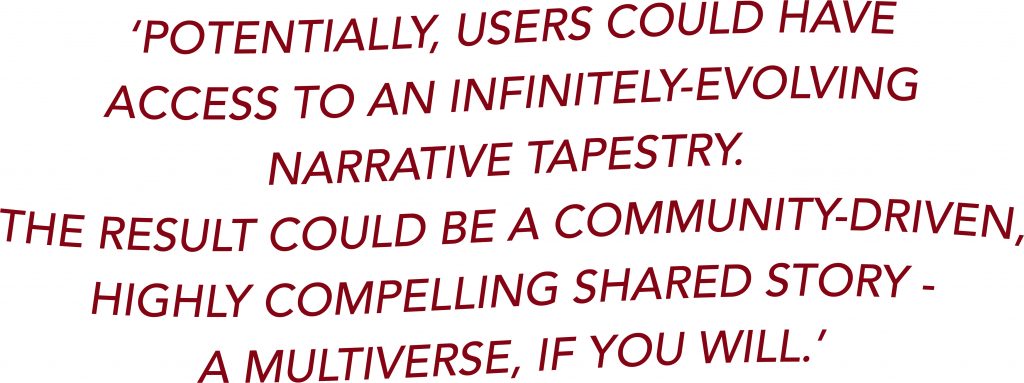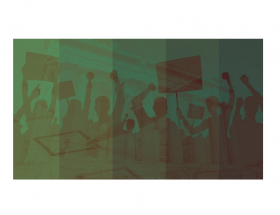“At that moment the veil of the temple was torn in two
From top to bottom.”
– Matthew 27:51 (New International Version)
The quill begat the pen; it also begat the press. History bears witness to the cycle of innovation being met with further innovation, from which subsequent developments then branch off. The cycle continues. As with all industries, publishing has been shaped by this constant ebb and flow of innovation, and much has been said about the future of the industry in the current digital age. The advent of the computer and then the Internet saw the turnover rate for these changes increase dramatically, with each new platform lowering the barrier to entry for amateur writers. The floodgates were thrown open by these new websites: many literary enthusiasts will be familiar with sites from the Web 2.0 iteration, such as Wattpad.com. However, it is the possibilities and new technologies of Web 3.0 that have fascinated me as of late. Much has been said regarding the longevity of traditional publishing in such an environment, but I think a key part of any argument in this debate is to first unpack a bit about why online publishing is so disruptive.
Traditional publishing houses, no matter their size, have a few main objectives: to analyse their target markets and discern what stories appeal to them, to select promising manuscripts and edit them, to market the finished book based on this appeal and sell as many of them as possible. Of course, there is a lot more nuance to it than this brief summary but, essentially, they are the gatekeepers when it comes to the mass consumption of printed literature. This isn’t necessarily negative. Their processes reassure customers of a certain level of quality, as well as a consistent schedule for new releases they can look forward to. So, if the status quo has such clear benefits, some might ask, what’s the issue? It’s been over twenty years now and we still haven’t seen the massive, Internet-driven shake-up promised by independent pundits. Traditional publishers have even found success establishing e-book arms of their companies. All of this is true. But I entreat such people to look around them: yes, the Internet challengers have a high turnover rate, but that cannot be taken to evince the infallible resilience of traditional publishing, nor can that inertia be assumed to be the main factor for these challengers coming undone. The reason why the challenge itself persists is because with each iteration the platforms evolve.
Apart from allowing consumers to produce their own original stories, many online storytelling platforms offer a near-infinite selection of ultra-specific stories, accessible at any time, from anywhere—and all for free. Wattpad.com was one such website that met all these criteria which I used regularly growing up*. Whatever genre I wanted to read, all I had to do was type in some key words, a prompt phase or the premise of what I had in mind and suddenly I had hundreds of options; hundreds of interpretations of my search criteria, each uniquely characterized by the writers’ own experiences and cultures. The search process was largely a reversal of the norm: on Wattpad, some specifics like the narrative and character tropes used revealed upfront to attract readers who like and have searched for those particular ingredients. As a young teenager, this was very liberating: though the quality of said stories admittedly varied (as there aren’t often standardised editing processes vetting uploads), I and many other readers enjoyed searching for our next read and shared a sense of satisfaction in finding a real gem. Numerous stories were also immensely entertaining even if they’d be considered amateur work outside of this virtual niche (it was all about characterisation for me). The effort that went into crafting a virtual cover and even including pictures and video references for characters, mood music and other worldbuilding details was also a big draw for me, and sparked my interest in multimedia storytelling.

What’s particularly interesting to me about such storytelling websites is that they take full advantage of the serialised publishing format, giving writers the opportunity to customise their work schedule and gradually amass a legion of loyal fans with every chapter uploaded. Those fans could offer feedback through the comments function, tagging feedback to the specific line or overall chapter, which fostered a healthy prosumer community where one read, wrote and reviewed fluidly. This dynamic engagement with the texts on three levels allowed for the line between authors and readers to blur, as one could wear different hats in the same sitting. Review enough books in a particular subgenre and other authors in that niche might reach out for feedback on their work, or you might be inspired to write your own. The interaction between users is therefore inherently different to how a traditional writer engages with their readership, and has some significant advantages: as these online readers are interacting with works-in-progress and not the finished book, their criticism often has bearing on the progression of the story, which in turn prompts reader to follow the story more loyally (now they have a stake in it beyond emotional investment). Readers share in a sense of happiness and accomplishment when authors make the leap to Amazon e-book sales, with some stories taking the circumvention full circle and going into print, or even being made into film adaptations like Beth Reeckles’ The Kissing Booth and its sequel.
Of course, one major drawback to all this flexibility is the inherent lack of certainty: as most users write unpaid and alongside school or work commitments, many stories are left unfinished as the author leaves to focus on their priorities or simply loses the desire to continue a particular story (which readers, though heartbroken, understand and relate to). But for those who follow through, the benefits of taking this particular route to publishing are very attractive: even the idea of being able to get e-books and a printed version down the line implies one can have one’s disruptive cake and eat it too. But this is only the surface of possibility where online publishing is concerned, as the last decade also saw a new generation of Internet technology gain traction in the mainstream; enter Web 3.0.
Web 3.0 basically takes the innovations of Web 2.0 (an era defined by users creating and sharing content) and enhances them. Now it’s not just us sharing things but how exactly we share them; it’s now possible not just to consume stories as a community but for a community to work on a story collaboratively. Blockchain is a technology that I propose could facilitate that. Originally purposed for transactional transparency (and widely associated with cryptocurrencies), blockchain can be simply described as a system for multiples parties to have access to a centralised ledger or database. To illustrate this: let’s say your local library sends the receipts for all overdue books to all its members via email. This gives each member their own copy. They could make alterations to their copy that don’t affect anyone else’s, and the library would need to send updated receipts as the fees increase. Blockchain, however, would allow all members to access and share ownership of the original list of receipts which (thanks to the cryptographic complexity of blockchain technology) is virtually tamper-proof and all updated versions are visible to all parties. This is the concept of decentralization: instead of a single party being in control of the receipts (how they are distributed, which version other users will access, etc.), this middle man is removed and all parties in the network have access. But beyond the realm of finance, I and several other literary enthusiasts (such as the teams behind start-ups Cellarius and Storichain) believe that blockchain could be central to 21st-century storytelling.
Blockchain is a technology that could take the collaboration of Google Docs and dial it to eleven. If you and I were co-writing a novel on Google Docs, we would be able to work on the same chapter simultaneously. Any edits I make would be visible to you in real-time, and every chapter would evolve as a blend of both our styles. With blockchain, however, it would be different: we’d each write one chapter at a time, like the Wattpad model. You could write the first chapter and I the next one, then you on the third and so on. We’d both contribute to the overall story one instalment (called a “block” when it comes to blockchain) at a time. Here’s where it gets really interesting. Readers would still be able to follow our story in real-time, but instead of being confined to the “Comments” section they’d be able to contribute directly to the story as well by continuing the story with their own block.
This addition of readers’ own voices to the narrative further heightens the connection between them and the original authors, thereby further blurring the lines between them. This is an exciting new frontier that has (theoretically) never been easier to explore than in our current digital age. Seeing how one’s original idea evolves as it passes through different writing styles (as blockchain keeps each previous block as new entries are added to the chain) will reveal just how malleable the art of storytelling is. It could potentially allow one to start a single narrative and then later jump back in and enjoy fresh takes on their original idea. It also creates a conducive environment for parallel, alternate narratives to branch off of the main storyline, as users can choose which block they want to continue the story from. This would be especially significant for the online climate, where derivative works are a large part of the prosumer community. Potentially, users could have access to an infinitely-evolving narrative tapestry. The result could be a community-driven, highly compelling shared story – a multiverse, if you will.
Though the widespread adoption of blockchain technology is somewhat stilted by the aforementioned cryptographic complexity (casual users aren’t likely to have the powerful computers needed to do the computation that allow for new “blocks” to be created), some minor adjustments and compromises could be made to a blockchain system that’s designated specifically for collaborative storytelling. Elements such as the absolute, tamper-proof nature of the blockchain could be foregone to allow authors the chance to make corrections and revisions to published chapters, which would eliminate the need for cryptographic hashing (the “complexity”) and make blockchain storytelling more accessible. There are also other areas of change that would make it a more efficient business model, like adding some permission restrictions, monetisation and working out ownership of the stories as intellectual property. But what does this all mean for the future of the traditional publishing industry?
Well, time will likely reveal it to be a lot more complicated than my speculation suggests. However, I do think that traditional publishers may find it useful to integrate these new technologies into their business plans: after all, if (as I’ve previously established) we are at least two generations forward from the advent of e-books as the sole expression of book publishing online, it stands to reason that one cannot continue to use an old strategy to ward off an ever-improving combatant. Though the hallmarks of Web 3.0 are about bypassing traditional gatekeepers, there is also much to gain from established players in the traditional sphere getting their feet in the game as well, adapting the benefits of tradition to this new domain and adding structure where it’s needed (for instance, in the areas of intellectual property rights, monetization for contributors and a profitable business model as a whole). In this same spirit, online and traditional publishing need not wrestle to render the other obsolete: like parallel timelines, their futures are not mutually exclusive but rather dependent. They need to learn from each other if they wish to maximize their profitability and relevancy in such a dynamic environment, especially as books are not the only storytelling medium vying for the same limited consumers and creative talent. For all my talk of evolution, though, it is interesting to note what Forbes.com cites as World Wide Web-creator Tim Berners-Lee’s vision for very the first iteration of his invention: “a collaborative medium, a place where we [could] all meet and read and write”. It seems as though we are finally coming full circle.
—
*This was between 2014-1016; as of 2021, Wattpad.com has introduced much more monetization through Coins, Paid Stories and Premium packages, as well as limiting offline downloads for free accounts. But for the purpose of this article, I’ll focus on those halcyon, frontier days I’m most familiar with, as I based my research on the format of that time.
Photography by Isabella Baxter




